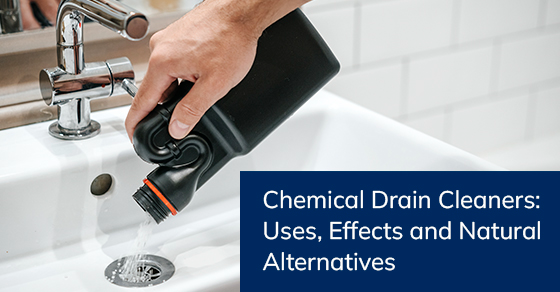 10
Aug 2023
10
Aug 2023
Chemical Drain Cleaners: Uses, Effects and Natural Alternatives
Having your drain get clogged can be an annoyance. It can smell awful and be complicated and messy to clean up.
Your drains can get clogged for several reasons, including hair and soap residue if it’s in your shower or food debris in your kitchen sink. Regardless of where in your home you have a drain, ensuring they are cleared is essential.
Even more than the headache, clogged drains can lead to standing water that weakens the structure of your home or creates unsafe living conditions from mould. Therefore, it is essential that you maintain clear and open pipes in your home.
One of the most common ways to maintain and unblock your drains is using chemical drain cleaners. This article will detail what these chemicals are, how they are used, and why there might be better options for your situation. We’ll take a look at some natural alternatives.
What are Chemical Drain Cleaners?
Drain cleaners are usually characterized as strong chemicals used to unblock your drains. These chemicals are powerful. Key ingredients include:
- Hydrochloric acid (which creates chlorine gas).
- Sulphuric acid.
- Sodium hydroxide (lye).
- A whole host of polysyllabic ingredients that are toxic and environmentally destructive.
They are typically effortless to use. All you need to do is pour the bottle down your drain. They also work exceptionally quickly, and because a chemical reaction is doing the work for you, there is no need for you to do anything other than weight.
Chemical drain cleaners are relatively cheap and versatile for handling most clogs in your drain.
Risks of Using Chemical Drain Cleaners
While there are many benefits to using chemical drain cleaners, they are not a perfect solution and can come with many associated problems. Firstly, they cannot clear all types of clogs. They work well on softer blockages like hair, grease, or food.
Still, they cannot effectively combat mineral buildup or solid objects stuck in your drain. These drain cleaners themselves can build up over time in your pipes, slowing the flow of water and even creating blockages of their own.
Of course, these are toxic chemicals and can cause damage to your pipes and surrounding areas or even injury to yourself. If you get any of the liquid on you, it can give you a nasty chemical burn.
It is also dangerous to breathe in the fumes created by the reaction. Since this reaction produces a great deal of heat, it can wreak havoc on plastic (PVC) piping or piping that has already been weakened.
Finally, you will not be surprised to learn that pouring such strong chemicals down your drain is devastating to the environment. Anything capable of essentially melting through blockages cannot be good for the waterways.
Natural Alternatives
Luckily, there are plenty of natural alternatives to toxic drain cleaners. Several of these alternatives require no more effort than chemical drain cleaners. You can protect and maintain your pipes for years with some preventative maintenance.
Drain Strainer
The best way to ensure your pipes don’t get clogged is never to have debris enter them in the first place. A drain strainer is a small catchment device that sits over the entrance to your drain and traps debris before it has a chance to get stuck in your pipes.
Strainers are easy to find and use and are cheap. You can choose from multiple styles to find the look you want.
Practice Good Drain Habits
As mentioned, preventing debris from getting into your pipes is the best way to protect them from clogs. Try not to pour grease or scraps down the drain. Instead, compost your food scraps. If you finish cooking and your pan is greasy, set it aside and allow the grease to cool and condense.
Once the grease has condensed, scrape it off and dispose of it before washing the pan in your sink or dishwasher.
Enzyme Drain Cleaner
Enzyme culture drain cleaner uses enzymes or bacteria to naturally eat away at your pipes’ debris. It can have the same effect as a chemical drain cleaner, but without any of the toxic fumes or pollution.
Enzyme drain cleaners work best if they are used for maintaining flowing pipes; they do have difficulty removing blockages that have already formed.
Drain Snake
A drain snake is a great way to remove debris and unclog your pipes. It is a type of auger specifically designed to locate and latch on to hair or debris, taking up space in your pipes. It is a more elegant tool than shoving a hooked piece of wire down into your drain.
Plunger
A plunger is an essential part of home maintenance. They can solve some pretty uncomfortable disasters quickly and cleanly.
They use a suction cup and force to create pressure that forces blockages out of your pipes. When purchasing a plunger, we recommend buying one with a sturdy handle for optimal strength and stability.
Boiling Water
Toxic chemical drain cleaners rely on heat to break up debris in your pipes. Instead of using a chemical reaction to generate heat, you can pour boiling water down your pipe to accomplish the same thing.
You can add baking soda and vinegar to increase the effectiveness of this tactic in a non-toxic way.
Bring In The Professionals
After trying these tactics, stubborn debris sometimes debris will not become unstuck. That’s when it’s time to call in the professionals.
We have specialized tools and techniques to ensure your drains are unclogged quickly and in a way that keeps them safe. Our expert team of professional technicians would be happy to help you with a clogged drain or any plumbing needs.
For more information about drain servicing, call Brothers Plumbing at 800-741-8471 or learn more and contact us here.
